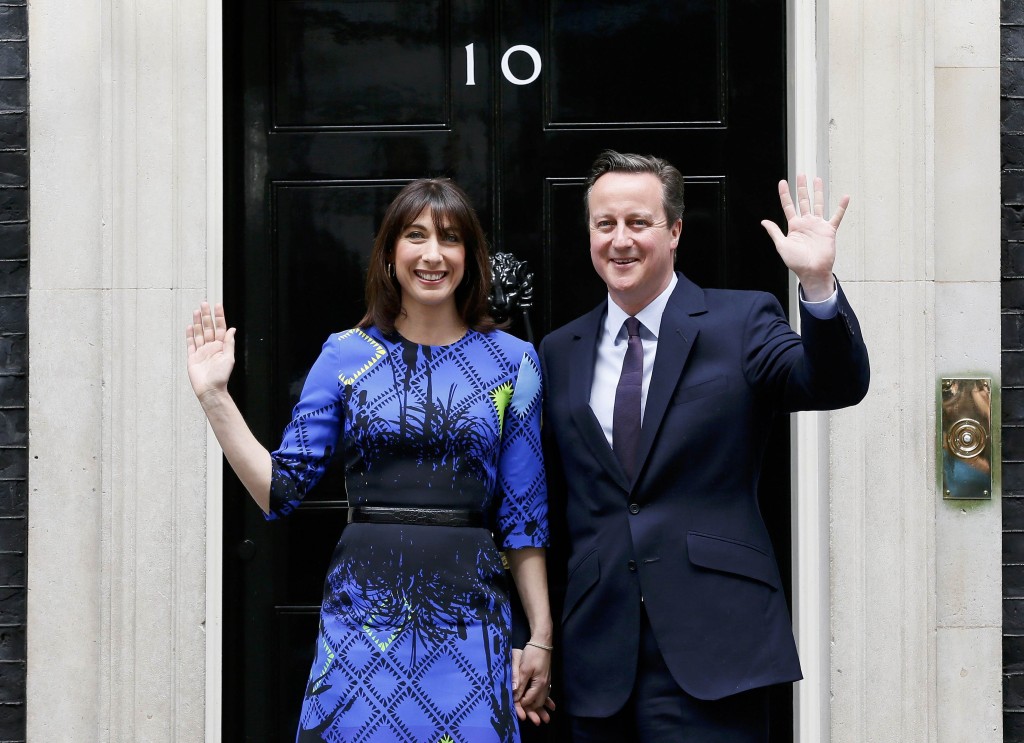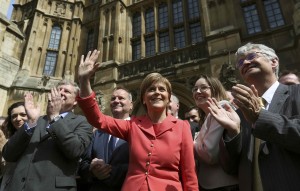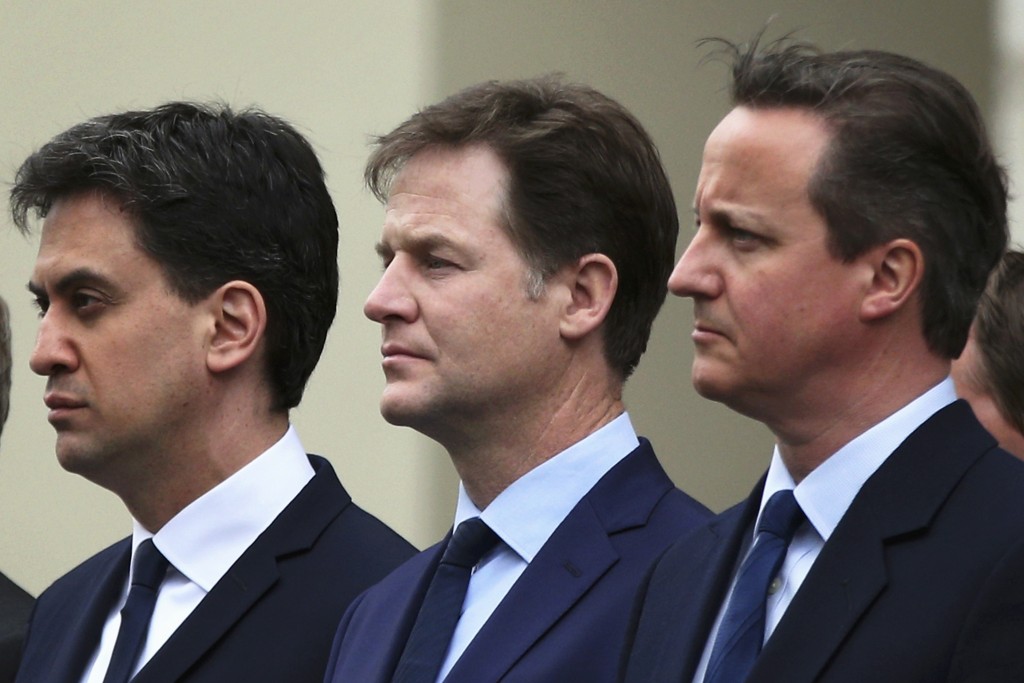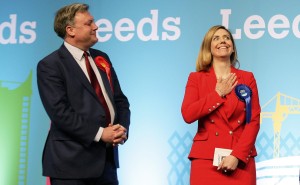David Cameron revels in surprise victory that secures a majority in second term as UK prime minister

Britain’s Prime Minister David Cameron and his wife Samantha return to Number 10 Downing Street in London after the British general election.
By James Grainger / World Editor
The polls got it wrong — and mightily wrong at that.
Britain woke up yesterday morning to an election result that stunned everyone — analysts, journalists, politicians and the public alike. After weeks of neck-and-neck surveys, the predictions of instability, horse trading and long coalition negotiations were irrelevant — the Conservatives had not only finished as the biggest party, they had even secured a slim majority in the House of Commons.
In the early hours, a triumphant David Cameron declared to party members at the Tory HQ that it was “the sweetest victory of all.”
The stories of the night are clear and numerous — vindication for the Tories, the complete failure of Labour’s push to the left under Ed Miliband, the SNP surge that will dramatically alter the make up of Parliament, the number of voters who turned to UKIP dissatisfied with the political mainstream, the fall of so many legendary British politicians and finally, the massacre of the Liberal Democrats, seemingly punished for their decision to help Cameron into office five years ago.
Britain woke up yesterday morning to an election result that stunned everyone — analysts, journalists, politicians and the public alike.
What’s also clear is that the first-past-the-post system has once again failed to represent the public’s views.
The SNP took 4.7 percent of the vote, yet emerges with 56 seats. The Liberal Democrats took 7.9 percent, yet have only eight seats. And UKIP, which took a huge 12.6 percent share has just one solitary MP.
But the electoral system will not change. Voters have already rejected a watered down version of proportional representation (Alternative Vote) back in 2011, and now the Conservatives will not have to bend to the demands of a coalition partner who wants change. That, however, does not mean Cameron will find it easy to lead. Hardline Tory backbenchers will push him hard on policies and mini-rebellions will likely be frequent. Some experienced analysts are already suggesting echoes of John Major’s surprise win in 1992. It could be messy.

Scotland’s First Minister and Scottish National Party leader Nicola Sturgeon waves as she poses with newly-elected SNP MPs in central London.
Cameron’s biggest challenge will almost certainly be the noisy bunch of Scots who will soon head down south to take their seats in Westminster. The fate of the union, once again, will be on Cameron’s plate.
For the rest of Europe too, the implications are huge. The prime minister will now have to deliver on his promise to hold an EU referendum in 2017.
Come the next election in 2020, Britain may be a very different place.
Beyond expectations
It began with an exit poll, released the minute that polling stations closed, which suggested the Conservatives would take 316 seats in the 650-seat House of Commons. Labour had been outperformed, the SNP would sweep Scotland and the Liberal Democrats would effectively be wiped out, the numbers suggested.
Party spokespeople across the aisles immediately preached caution. The Tories were quiet but their confidence increased. Live on TV, Paddy Ashdown, a Lib Dem icon, said he would “eat his hat” if exit polls were right. Tony Blair’s ferocious former director of Communications Alastair Campbell, said it didn’t feel right. He vowed to eat his kilt. One Labour source said Ed Miliband’s staff immediately fell silent when the poll came through.
It wasn’t accurate and it seems the clothing will remain untouched. But only because the result was even more positive for the Conservatives than the prediction.
In the end, they had 331 seats, enough for a majority, albeit a thin one. They would not even need the support of any other party to form a government. Cameron’s trip to see the Queen effectively became a rubber stamp.
The Tories were not the only big winners. North of the border, Scottish National Party MPs were cheering time and time again. The Scottish surge swept aside nearly everything in its path, leaving just a handful of seats to the rest. Voters were rejecting the incumbent Labour MPs, rejecting the incumbent Liberal Democrat MPs. The consequences of the independence referendum and the Better Together campaign that allegedly “saved the union” were clear for all to see. But more importantly, more pointedly, many in Scotland were voting for an end to austerity, as SNP leader Nicola Sturgeon had repeatedly claimed. They were occupying the left and demanding change. The SNP and the Tories are now set for a collision course in the Commons.
The consequences of the independence referendum and the Better Together campaign that allegedly “saved the union” were clear for all to see. But more importantly, more pointedly, many in Scotland were voting for an end to austerity, as SNP leader Nicola Sturgeon had repeatedly claimed. They were occupying the left and demanding change.
For Labour and the Liberal Democrats, the sob stories weren’t just coming from Scotland. Labour failed to win many of its targets in the rest of the UK. As the night dragged on into the early hours, marginals were lost and it became clearer they had failed. Each result got worse. The only positives came down in London, where they gained seats, but that will come as cold comfort in a night of awful results.
The Liberal Democrats meanwhile were crushed. Failing to gain a single seat, they lost 49 MPs in a massacre that seemed almost too cruel to be true. The coalition deal came back to haunt them. It seems the Tories won credit for the last five years, while the Liberals were punished for their contribution. Many of those Liberal losses were gained by the Tories.
Deputy Prime Minister Nick Clegg, despite retaining his own seat (with a reduced majority), saw the writing on the wall and quickly fell on his own sword. And he wasn’t the only big name to suffer a bad night.

Ed Miliband, Nick Clegg and David Cameron, a day after Britain’s general election, as they line up to pay tribute at the Cenotaph during a Victory in Europe (VE) day ceremony in central London, May 8, 2015.
How the mighty fell
As the country awoke from its slumber and the dawn got brighter, along came a piece of news that would cheer the Tories almost as much as their new majority.

Conservative candidate Andrea Jenkyns reacts after being declared the new member of parliament for Morley and Outwood, while Britain’s opposition Labour Party shadow Chancellor Ed Balls looks on, in Leeds, on May 8, 2015.
In West Yorkshire, in the constituency of Morley and Outwood, one of the biggest beasts fell.
Ed Balls, Labour’s shadow chancellor, the man the Conservatives love to hate, lost his seat to Tory candidate Andrea Jenkyns by just 422 votes. Even Jenkyns looked stunned on the stage.
Balls, dating back to Brown and Blair, and on the frontline so normally a vocal, aggressive presence in the House of Commons, delivered a magnanimous concession speech, but the pain was clear to see. Just a day before, he may have daydreamed he would be preparing the UK for a new economic plan in Downing Street — 24 hours later he is not even an MP. But he was was just one in a number of big names to fall from grace.
Labour lost Jim Murphy, its Scottish leader. The extent of the party’s wipeout in Scotland was summed up even more poignantly by the fall of its election campaign chief, Douglas Alexander, another heavyweight. He lost to 20-year-old SNP candidate Mhairi Black, who becomes the youngest MP since 1667.
By midday, Miliband had resigned. In an earlier speech after winning his seat he had confessed it was a “difficult and disappointing” night for Labour, who will now go through a long period of soul-searching. The heady times of 1997 now seem a long way away.
Miliband was joined by other leaders Nick Clegg and Nigel Farage in delivering resignation speeches. Three of the parties are now without a leader.
Farage, who should be happy with the many voters backed his eurosceptic party, had promised to resign if he failed to win his targeted seat in South Thanet. UKIP, despite their share producing only seat, took many voters from both Labour and the Conservatives, finishing second in many seats.
Miliband was joined by other leaders Nick Clegg and Nigel Farage in delivering resignation speeches. Three of the parties are now without a leader.
The UKIP leader looked disappointed on stage and did stick to his promise, but he implied he may return as leader after a short break, so his resignation can be seen perhaps as more of a “half gap year” than the end.
For Clegg, there were warm words from the prime minister, who will remember the assistance the Lib Dem leader gave him. But they too will be cold comfort. Clegg has gone from the biggest success story in an election to the biggest failure in just one term. The impact on the Liberals was fierce and they lost many of their iconic and well-known politicians — Danny Alexander, Vince Cable, Charles Kennedy, David Laws, Simon Hughes.
Clegg has gone from the biggest success story in an election to the biggest failure in just one term.
All those campaign trail words about anchoring the Tories in coalition and halting their most drastic proposed cuts are now worthless. The public instead embraced Cameron and the Conservatives.
It will not be smooth sailing for the returning prime minister. He faces many challenges but David Cameron now has the power — if he can keep his own party onside and in check — to deliver the changes for Britain he promised on the campaign trail.
Against everyone’s expectations, he has delivered his party a decisive, albeit slim, victory.
@urlgoeshere
Originally published in the Buenos Aires Herald, on Saturday, May 9, 2015.
